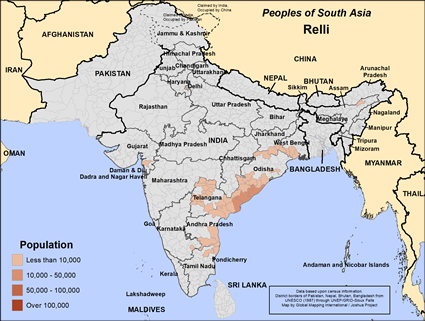Relli in India

Photo Source:
Anonymous
|

Map Source:
People Group data: Omid. Map geography: UNESCO / GMI. Map Design: Joshua Project.
|
| People Name: | Relli |
| Country: | India |
| 10/40 Window: | Yes |
| Population: | 149,000 |
| World Population: | 149,000 |
| Primary Language: | Telugu |
| Primary Religion: | Hinduism |
| Christian Adherents: | 0.96 % |
| Evangelicals: | 0.00 % |
| Scripture: | Complete Bible |
| Ministry Resources: | Yes |
| Jesus Film: | Yes |
| Audio Recordings: | Yes |
| People Cluster: | South Asia Dalit - other |
| Affinity Bloc: | South Asian Peoples |
| Progress Level: |
|
Introduction / History
The term "relli" means a kind of grass in the Telugu language, and the traditional occupation of the Relli community was to gather and sell grass. At present, the Relli sell fruits and seeds and also involved in other occupations, including street sweeping and scavenging. They are a scheduled caste in Andhra Pradesh. The community includes a few social subdivisions and each of these includes several clans.
What Are Their Lives Like?
They historically have not sent girls to school, and boys often study only up to primary level for economic reasons. The Relli are an oppressed, suppressed and depressed people.
What Are Their Beliefs?
They are Hindu, but several have become Christians.
What Are Their Needs?
Most of the Relli people live in Andhra Pradesh. There have been efforts in this state to "re-convert" low class communities back to Hinduism from Christianity.
Christians can minister to low caste groups such as the Relli in various humanitarian ways. These efforts can help earn the respect and trust necessary to receive the gospel message.
Prayer Points
Several hundred Relli have reported themselves as Christians to the census of India. Pray the Lord will send teachers who will disciple them and teach them to disciple others.
Pray for the Holy Spirit to grant the Relli people spiritual hunger and discernment.
Please pray these low caste individuals will gain self-respect as well as respect from those communities around them.
Pray that parents will see the importance of providing a good education for their children, and that they will be able to afford this education.